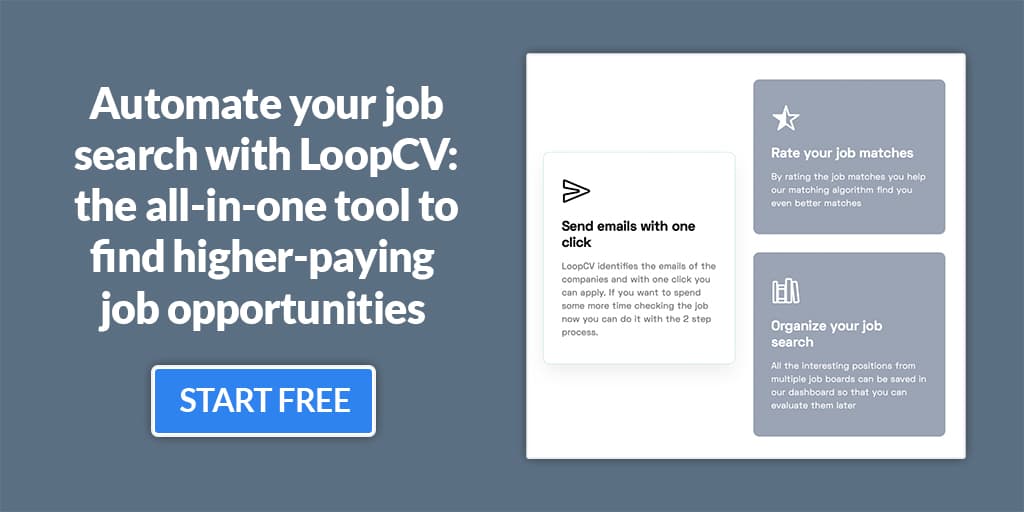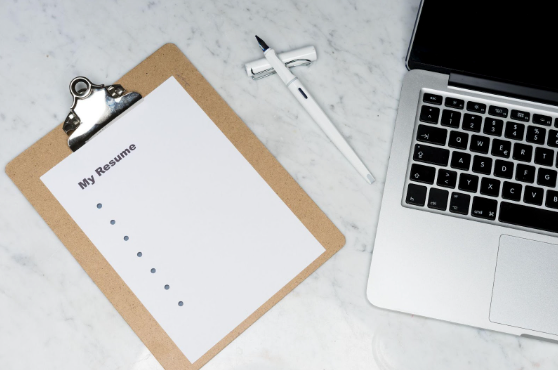Here Are 5 Job Interview Types You're Likely To Encounter
Companies use several common types of job interviews depending on what employers are looking to assess, and the role they're looking to hire.
You might be interviewed over the phone or in a group interview with two or more candidates. Maybe you'll be asked to have lunch with the recruiter or to determine how you've handled past situations through a behavioral interview.
» FREE TRIAL: Get Started with LoopCV & Send Out 100s of Highly-Targeted Job Applications in <10 Minutes
All different types of interviews serve the same purpose; to evaluate applicants' skills, knowledge, experience, education, and personality.
Feel free to ask the recruiter what type of interview will be conducted. Knowing what you should expect helps you structure your interview preparation properly.
Here are 5 common job interview types to prepare for:
Interview Type #1: Screening and Phone Interviews
Nailing preparation for this type of interview is key since screening and phone interviews are the first steps in the process and will determine if you go on to further interviews.
Many companies are carrying out pre-interview telephone screening before conducting a face-to-face interview. Phone interviews help recruiters narrow down the pool of candidates for a personal interview. Often, companies start with an unscheduled phone call.

Ask the interviewer politely to perform a phone call, even later on that same day, and arrange for a set time. Before the interview, research the company and jot down information.
In a well-lit and quiet environment, lay your pen, your notebook, and your resume in front of you. Avoid using your laptop during the interview since the sound of the keys clicking might be disturbing for the interviewer.
Even if this is a phone interview, you can still ask questions and clarify some details about the job and the company. But don't rush and interrupt the interviewer.
During phone interviews, you can still ask questions and clarify some details about the job and the company. But don't interrupt the interviewer.
Speak clearly, take breaks between answers and questions and, most importantly, think about what you want to say before each answer—don't rush through them.
It is essential that the interviewer feel you are eager and enthusiastic about the job.
This is more difficult for you due to the absence of body language.
You should make the interviewer realize that you strongly match for the role skill-wise and that you are interested and confident to learn more about it.
When you're searching for a job, you should always be alert to answer your phone in a professional manner and with high energy.
Interview Type #2: One-on-One Interviews
A solo candidate answering a solo interviewer's questions…
A common scenario in the world of hiring. Usually, face-to-face interviews take place after screening interviews. This interview will be more detailed than the phone interview.
You have fulfilled the initial requirements for the job, and now the recruiter wants to ascertain how you will fit into the organization. This kind of interview is formal and structured.

After some icebreaker questions, the interviewer will continue with more traditional questions about your education, work experience, and skills.
The traditional one-on-one interview helps recruiters figure out if you're the ideal candidate for the role. The candidates are judged for their skills.
Stay focused on the interviewer and keep your answers concise.
Before the interview, ensure you are prepared and demonstrate how your skills and abilities match the job requirements. Also, practice some common interview questions, as well as potential questions for this particular role.
Interview Type #3: Group Interviews
The group interview, which includes multiple applicants for the same position being interviewed together, tests your ability to function in a group.
Two or more candidates are set against each other and try to express their talents, professionalism, and leadership skills.
The way participants act under pressure will indicate whether they fit the position.
There is no need to get stressed out during this interview. You are already one of the top candidates, and you only have to stand out among the rest. A group interview is also when several members of a company interview you at the same time. This is called a panel interview.

This method saves time because you only have to answer the interviewers' questions once, and the company can quickly pre-screen the top candidates for their opening.
During a panel interview, ensure you engage with all panel members and maintain eye contact with the panel member asking the current question. It's important to remember each interviewer's name and mention them during the conversation.
You should connect with all the interviewers as individuals and not ignore either change your communication style to any of them.
Interview Type #4: Lunch Interviews
Lunch interviews differ a lot compared to all the other types since they take place over a meal. Worrying about the interview questions is not the only consideration you should have.
Nowadays, many interviewers choose to see candidates in more of a natural light, outside of an office setting. You should make a professional impression in a casual environment.

In more relaxed surroundings, the interviewer will confirm whether you are able to handle yourself gracefully and overtake the stress of a job interview.
But as the interviewee, you need to be strategic in your approach.
Use your best table manners and avoid ordering anything too expensive, messy to eat, or alcoholic beverages. Don't order selections you won't eat.
In a lunch interview, you don’t have to worry about paying.
The interviewer has invited you there, and they will be expected to pay.
Always keep in mind that the interviewer will be watching how you interact with the host, the serving staff, and other people in the restaurant.
Keep up a good conversation and take advantage of the time by asking any questions you may have about the company or position.
Interview Type #5: Behavioral Interviews

Behavioral Interviews can take place during any of the above interview types.
During this type of interview, candidates are judged for their behavior.
The recruiters will examine your behavior patterns rather than correct answers.
You will be asked how you handled difficult situations in your previous job, and your responses will help the interviewer discover how you'll act in the current position.
A common question in behavioral interviews is:
"Share an experience when your boss told you to do something you knew was wrong. What was going on and how you handled it?"
In contrast with the traditional job interviews, during a behavioral one, you'll be asked to describe, in detail, how you dealt with a specific situation in the past that is similar to the ones you'll be encountering in the role you are interviewing for.
Before a behavioral interview, review your resume and recall a list of challenges and issues you were faced with and how you conquered them.
When you're interviewed, perform your stories with a great passion, demonstrate all your competencies through the story-telling, and answer questions confidently.
Depending on the job listing you're applying for, you will most likely go through various kinds of interviews. Take advantage of LoopCV to apply to better jobs. The tool provides you with the info you need to prepare for any type of job interview.
Originally published Mar 31 2021

Frequently Asked Questions
1. What are the 5 types of interviews?
Five of the most common types of job interviews are the traditional (aka one-on-one interview), group interviews, phone or screening interviews, lunch, and behavioral interviews.
2. What are the different types of interviewing?
There are several different types of interviews depending on the job listing you're applying for. All types serve the same purpose of evaluating the candidates' ability to fit a job position.
3. What are some examples of job interviews?
Employers conduct different types of interviews, such as group interviews, case interviews, behavioral interviews, phone interviews or interviews held over a meal.
4. Which type of interview is best?
Depending on each job position, companies will conduct different types of interviews to meet their goals. The most frequently used interview technique is structured traditional interviews. Behavioral interviews are also in a tight competition.



